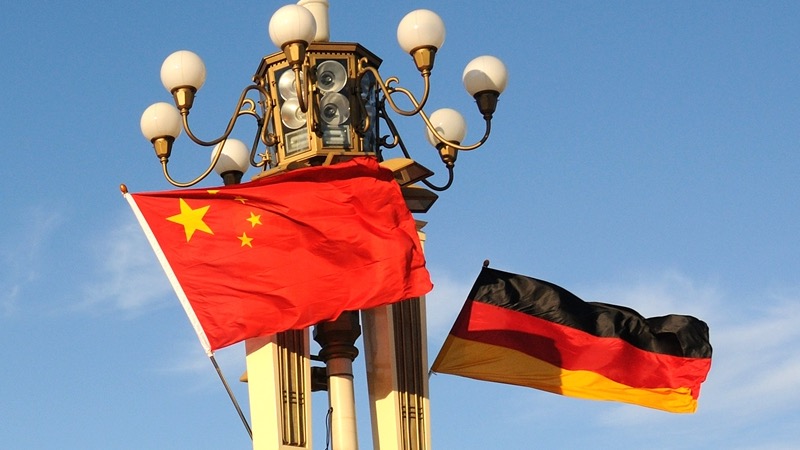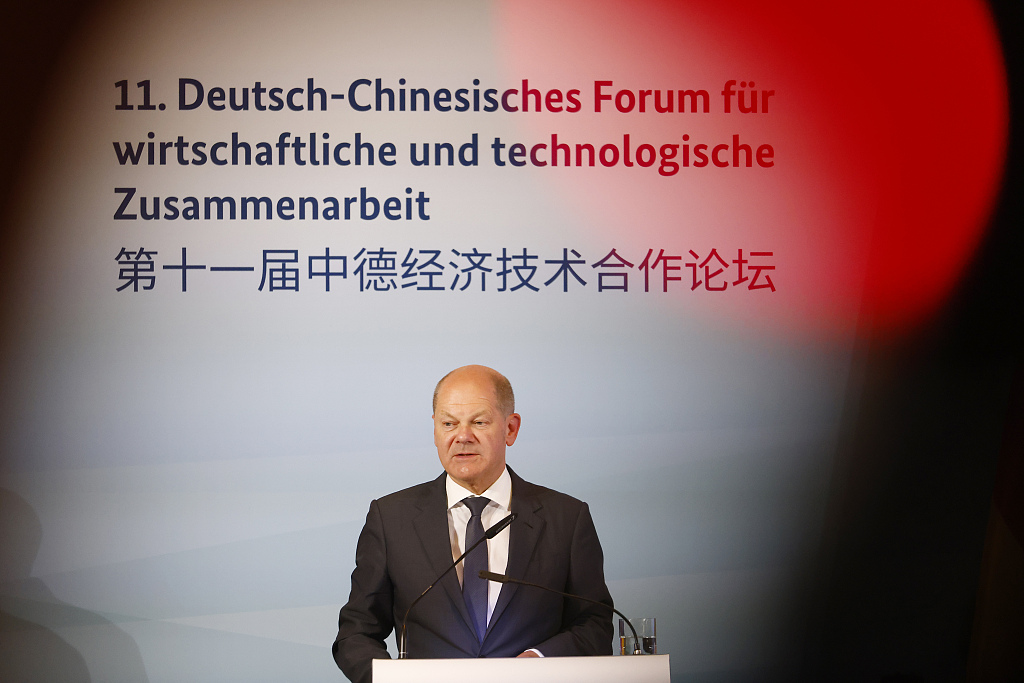
The national flags of China and Germany. /Xinhua
The national flags of China and Germany. /Xinhua
Editor's note: Emilia Fernandez, a special commentator for CGTN, is a security and political analyst with a focus on South Asian geopolitics, and PhD researcher at the University of Lucerne, Switzerland. The article reflects the author's views and not necessarily those of CGTN.
Recently, Germany has published, for the first time in its history, its "comprehensive China strategy," a policy to minimize its economic reliance on Beijing, arguing the urgent need for "de-risking" from China. This strategy paper simultaneously dubs China as a "partner, competitor, and systemic rival."
In his tweets on this 64-page paper, German Chancellor Olaf Scholz said "Our aim is not to decouple from Beijing. But we want to reduce critical dependencies in the future." While the policy of "de-risking" from China may seem appealing to some, it is imperative to carefully consider, both from diplomatic and economic perspectives, the potential "price of divorce" and the "perils of disconnecting" with China which should not be overlooked.
China has consecutively become Germany's most important trading partner for the last seven years, making them integral to each other's economic success. Even this hasty strategy paper admits that China is Germany's single largest trading partner. According to Germany's Federal Statistical Office, their two-way trade surpassed $335.3 billion in 2022. Around 6,000 German-based companies are conducting business operations in China which is expected to increase.
Besides, the survey by the German Chamber of Commerce has revealed that 77 percent of German companies have plans to expand their business in China over the next five years. This data reflects the significance of the economic relations between Beijing and Berlin, which will face a blow because of this extreme approach.
On top of that, the "de-risking" strategy raised doubt among the German business community about whether this strategy will be able to ensure the delicate balance of minimizing economic dependency on China while not endangering commercial and financial ties.
Reducing economic engagement with its largest trading partner without a well-thought-out plan, Germany is actually putting shackles on its economic interests and worsening the economic fallouts triggered by the Ukraine crisis and COVID-19 pandemic, ultimately moving towards economic shocks and slowdowns.
As the world's second-largest economy, China has a significant and sustainable presence in global supply chains. Many German companies have established manufacturing facilities in China and depend on Chinese suppliers to ensure cost competitiveness.
Berlin's decision to shift supply chains away from China will be complex, costly, and time-consuming. Moreover, the decision to turn away from China will disrupt the global supply chains, leading to increased production costs for German investors.
China boasts a market of more than a billion consumers. The Chinese consumer market is marked by a rapidly expanding middle class with high purchasing power and evolving consumer behavior. With this vast untapped consumer, the Chinese market presents a tremendous opportunity for German companies looking to achieve long-term growth by boosting sales.
As the "de-risking" strategy restricts access to this huge consumer base, German businesses will lose the potential profits and market diversification opportunities offered by the Chinese market.

German Chancellor Olaf Scholz speaks during the closing ceremony of the 11th Germany-China Economic and Technical Cooperation Forum in Berlin, Germany, June 20, 2023. /CFP
German Chancellor Olaf Scholz speaks during the closing ceremony of the 11th Germany-China Economic and Technical Cooperation Forum in Berlin, Germany, June 20, 2023. /CFP
China has a pool of skilled and dedicated workforce that has been instrumental in contributing to China's rise as a global economic powerhouse. Noteworthy, German companies are attracted to China because of the low labor costs. After this hardline strategy, German entrepreneurs who depend on Chinese skilled labor or outsource parts of their operational activities to China will face difficulties in finding an alternative skilled labor force at such a low cost.
In an increasingly interconnected and interdependent world, strategic partnerships between countries have become crucial for economic growth, global cooperation, and geopolitical stability. Officially, China and Germany, two global powerhouses, have forged a comprehensive strategic partnership based on common interests, shared goals, and mutual respect.
Every year, the respective government heads and the majority of the cabinet ministers meet to have discussions on bilateral and international issues and promote trust and understanding. This "de-risking" strategy may have unintended consequences on their strategic partnership.
China, Asia's biggest economy, and Germany, the EU's biggest economy, have collective responsibilities in addressing common global challenges and ensuring peace and prosperity. From the perspective of these shared responsibilities, Berlin should have viewed Beijing as an indispensable partner in tackling global challenges, not adversaries.
Obviously, abrupt distancing from China will exacerbate mistrust and misunderstandings which German should address immediately for reviving the global economy and ensuring global stability.
(If you want to contribute and have specific expertise, please contact us at opinions@cgtn.com. Follow @thouse_opinions on Twitter to discover the latest commentaries in the CGTN Opinion Section.)